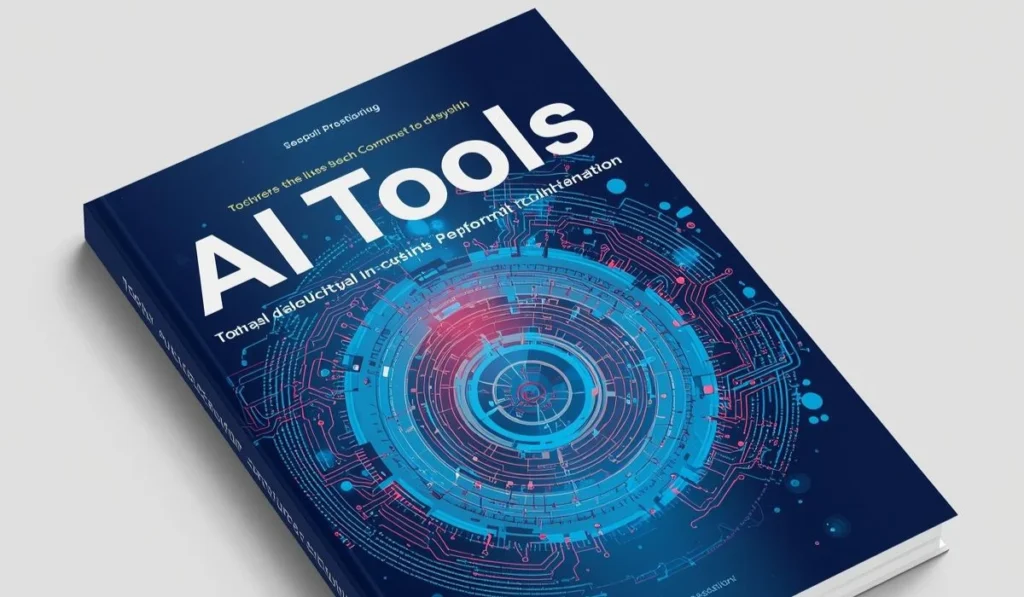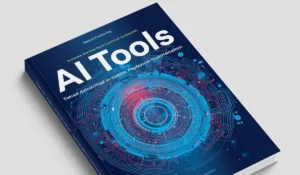The world of artificial intelligence is rapidly expanding, and AI tools are no longer limited to software developers or tech enthusiasts. Moreover, today, a comprehensive AI tools book can serve as an essential guide for professionals, students, and hobbyists seeking to understand and leverage AI in their daily lives.
Such a book typically covers a wide range of AI applications, from automated content creation to predictive analytics and decision-making processes. By exploring these tools, readers can learn how to optimize workflows, enhance creativity, and make data-driven decisions with confidence.
An AI tools book explains platforms and software with practical examples and case studies. It gives readers hands-on experience, clarifying both the “how” and “why” of each tool. Moreover, it often covers ethical AI, including biases, privacy, and responsible practices.
How AI Tools Books Enhance Learning and Expertise

An AI tools book is more than a guide; it simplifies complex AI concepts without overwhelming jargon. Consequently, by breaking topics into manageable sections, readers gradually develop technical proficiency and gain both theoretical knowledge and practical applications, bridging learning with real-world execution.
Furthermore, these books often include expert commentary from industry leaders, offering authoritative insights on emerging trends. With proper guidance, a well-written AI tools book can turn curiosity into actionable skills, enabling readers to apply AI solutions across business processes and creative projects.
Key AI Tools for Productivity and Creativity
Understanding the tools that drive AI innovation is crucial for maximizing productivity. For example, a dedicated section in an AI tools book often highlights essential software that enhances efficiency and creativity.
-
Content generation platforms: Automate writing, summarizing, and ideation processes.
-
Data analysis tools: Analyze large datasets for actionable insights.
-
Design and visual AI tools: Generate graphics, videos, and visual assets quickly.
-
Collaboration tools: Streamline team projects with AI-enhanced planning and communication.
-
Automation software: Reduce repetitive tasks and free up time for strategic initiatives.
Additionally, by listing these tools with examples and practical tips, readers can quickly identify which solutions align with their goals and expertise level.
Benefits of Using an AI Tools Book
For both beginners and seasoned professionals, an AI tools book offers clear advantages. It accelerates learning, provides hands-on examples, and supports informed decision-making. Additionally, it fosters ethical awareness and helps readers stay updated with emerging AI trends.
-
Accelerated learning: Gain foundational knowledge quickly with structured content.
-
Hands-on examples: Apply AI concepts in real-world scenarios.
-
Decision support: Make informed choices about software and workflows.
-
Ethical awareness: Understand responsible AI usage and potential pitfalls.
-
Competitive edge: Stay updated with emerging technologies and trends.
Moreover, this structured guidance ensures readers not only learn AI tools but also integrate them effectively into their professional or personal projects.
Exploring AI Applications in Daily Life

AI tools are becoming relevant beyond technical fields, influencing daily activities like travel planning and creative projects. When exploring Hamburg places to visit, AI can analyze data, suggest itineraries, and recommend personalized experiences. As a result, users save time and get more tailored results than traditional methods.
In addition, AI applications enhance productivity management, personal finance, education, and content creation. An AI tools book helps users understand these tools’ functions and their impact on efficiency and decision-making. Consequently, readers can make informed choices and confidently adopt AI solutions.
How AI Tools Transform Industries
AI tools are transforming industries like marketing, finance, healthcare, and the creative arts. In marketing, predictive analytics and automated content boost engagement and ROI, while healthcare professionals use AI for diagnostics and personalized care. Additionally, artists leverage AI to create visuals and designs faster than ever.
Furthermore, AI’s integration into industries shows its versatility and transformative potential. A comprehensive AI tools book provides examples and case studies demonstrating AI’s impact on performance. By exploring these real-world applications, readers gain practical knowledge that goes beyond theory.
AI Tools and Travel Planning: Hamburg Edition
Travel planning has been significantly enhanced by AI, particularly when researching destinations like Hamburg places to visit. Moreover, AI-driven platforms can analyze hotel ratings, transportation schedules, weather patterns, and user reviews to create personalized itineraries.
-
Customized itineraries: Suggest the best routes and attractions based on preferences.
-
Local insights: Highlight hidden gems and cultural experiences.
-
Travel optimization: Recommend optimal travel times and modes of transportation.
-
Budget management: Analyze costs and suggest affordable options.
-
Enhanced convenience: Provide real-time updates on events and reservations.
Consequently, by combining AI tools with human creativity, travelers can craft memorable experiences while saving time and effort.
Learning AI Through Practical Exercises

An effective AI tools book doesn’t just describe software; instead, it includes exercises that reinforce learning. These exercises allow readers to explore tool functionalities, analyze results, and troubleshoot common issues. Hands-on practice ensures that concepts are understood at a deeper level and skills are retained over time.
Additionally, many books provide challenges or projects that simulate real-world applications. For example, users might create a marketing campaign using AI content tools or plan a travel itinerary highlighting Hamburg places to visit. Thus, such exercises cultivate problem-solving skills and enhance confidence in using AI independently.
Ethical Considerations in AI Usage
Understanding the ethical implications of AI is critical for responsible use. In particular, an AI tools book often dedicates a section to data privacy, algorithmic bias, and transparency. Readers learn how to evaluate software for ethical compliance, ensuring that AI applications do not inadvertently cause harm.
-
Privacy awareness: Protect sensitive data while using AI tools.
-
Bias detection: Identify and mitigate algorithmic biases.
-
Transparency: Ensure AI decisions are understandable and explainable.
-
Compliance: Follow relevant regulations and guidelines.
-
Sustainable AI usage: Adopt AI practices that balance efficiency and ethics.
Moreover, by addressing ethics alongside practical applications, these books promote responsible AI adoption in both personal and professional contexts.
FAQs About AI Tools Books
Q1: Who can benefit from an AI tools book?
Anyone from beginners to professionals seeking practical AI knowledge and tools.
Q2: Are AI tools books suitable for non-technical users?
Yes, many books are designed to simplify complex concepts for all readers.
Q3: Can AI tools books help with travel planning?
Absolutely. AI tools can optimize itineraries and suggest personalized experiences, such as Hamburg places to visit.
Q4: Do these books cover ethical considerations?
Yes, most include guidance on privacy, bias, and responsible AI use.
Conclusion
AI tools books provide a structured way to explore the world of artificial intelligence, combining theory, practice, and ethical guidance. Some AI tools can even generate videos, making complex concepts easier to visualize. These resources help readers understand, apply, and innovate with AI effectively.
By leveraging these resources, readers gain technical expertise and build confidence in AI. Businesses can use AI tools for client reporting to save time and enhance accuracy. For a complete guide on practical applications, download the AI Tools Book PDF here to maximize efficiency and discover actionable strategies for implementing AI in your workflow.
By leveraging these resources, readers gain technical expertise while building confidence and responsibility in AI. Businesses and professionals can use AI tools for client reporting to save time and improve accuracy. For a complete guide on practical applications and detailed definitions of AI tools, check out our AI Tools Dictionary to maximize efficiency.










